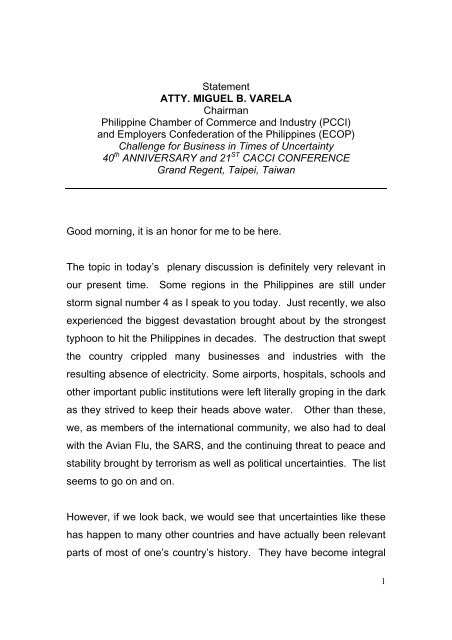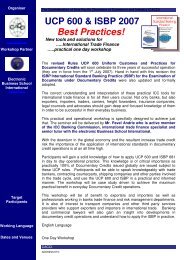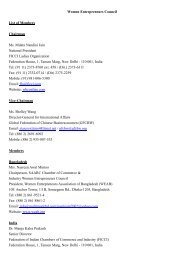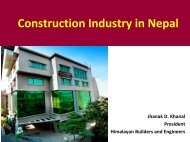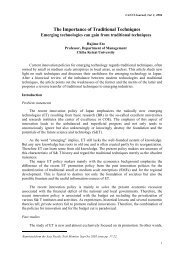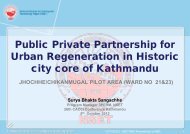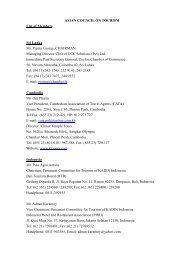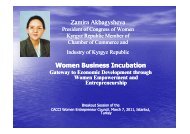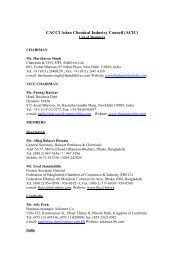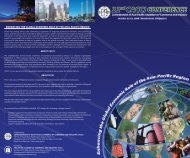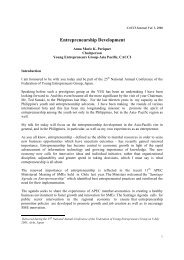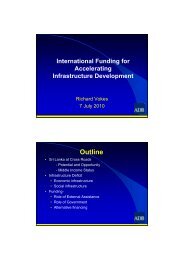Statement ATTY. MIGUEL B. VARELA Chairman Philippine ... - cacci
Statement ATTY. MIGUEL B. VARELA Chairman Philippine ... - cacci
Statement ATTY. MIGUEL B. VARELA Chairman Philippine ... - cacci
Create successful ePaper yourself
Turn your PDF publications into a flip-book with our unique Google optimized e-Paper software.
<strong>Statement</strong><strong>ATTY</strong>. <strong>MIGUEL</strong> B. <strong>VARELA</strong><strong>Chairman</strong><strong>Philippine</strong> Chamber of Commerce and Industry (PCCI)and Employers Confederation of the <strong>Philippine</strong>s (ECOP)Challenge for Business in Times of Uncertainty40 th ANNIVERSARY and 21 ST CACCI CONFERENCEGrand Regent, Taipei, TaiwanGood morning, it is an honor for me to be here.The topic in today’s plenary discussion is definitely very relevant inour present time. Some regions in the <strong>Philippine</strong>s are still understorm signal number 4 as I speak to you today. Just recently, we alsoexperienced the biggest devastation brought about by the strongesttyphoon to hit the <strong>Philippine</strong>s in decades. The destruction that sweptthe country crippled many businesses and industries with theresulting absence of electricity. Some airports, hospitals, schools andother important public institutions were left literally groping in the darkas they strived to keep their heads above water. Other than these,we, as members of the international community, we also had to dealwith the Avian Flu, the SARS, and the continuing threat to peace andstability brought by terrorism as well as political uncertainties. The listseems to go on and on.However, if we look back, we would see that uncertainties like thesehas happen to many other countries and have actually been relevantparts of most of one’s country’s history. They have become integral1
parts of our heritage. They are intertwined in our past, and havehelped define our people and our country. How we coped withtragedies and emergencies like these brought about the best in eachof us. We have learned that we must embrace pain, but thereafterburn that pain as fuel for our journey to success. Adversity is like astrong wind. It tears away from us all those that are unnecessary,and leaves those that cannot be torn, so that we see ourselves as wereally are. Adversity strengthens our mettle and hardens our resolve.Today we live in an interconnected world. This development confirmsMarshall McLuhan’s noted concept of the global village which hearticulated in the 1960’s well ahead of the widespread use of theInternet and wireless cellular phones.Such interconnectivity has created a borderless global economicregime that covers all societies, big and small. No economicdisturbance anywhere is so remote that it does not send waveseverywhere.The information explosion brought about by computers whose powerkeeps on expanding with continuous improvements in the microchipproduction technology has given birth to a knowledge society thatgoes beyond country barriers. It has also empowered countrieswhich only a decade ago were considered, the Third World by thestandard of the traditional advanced economies.2
The knowledge revolution through Information Technology has alsotriggered a shift in the focus of economic power, to Asia. It haslikewise blurred the demarcation line between politics and economics.Oil, terrorism and global warning are not purely political issues. Theyhave serious economic implications as well.Today’s world of business is also marked by dwindling exhaustibleresources. Concern for the quality of the environment, decent workfor all, and integrity and transparency in corporation behavior is nowpart of the global action agenda.Truly, the familiar way of doing business and of getting things donehas changed too. There is a new dynamics as compelled by newdemands, pressures and expectations.It is therefore important for businesses to think proactively. Everybusinessman who wants to succeed in today’s dynamic and everchanging global market needs more than strategies forcompetitiveness. For every business plan, there should be acontingency plan, a plan B in case plan A fails. Indeed, there is nosubstitute for preparedness. It would be folly to plan a businesswithout a backup plan to cope with any untoward emergency.This is especially true for businesses which have gone global.International business, as compared with domestic business, isusually characterized by increased uncertainty. While there is a need3
to develop short term plans to solve immediate problems, there is anequally important and urgent need to build long-term plans.We need to create realizable, long-term plans to ensure oursustainability and survival. During calamities, electricity-intensivebusinesses need generators in case of brownouts. In days ofeconomic slumps where retrenchment is a necessity, one employeemay be required to perform the work of five people.Faced with uncertainties, several businesses have to shape up andattain unparalleled efficiency to keep them above water. Manycompanies had to deal with the increased cost of doing businessbrought by uncertainties and calamities. Some had to lay-off workers,cut down on expenses, and tighten their belts to weather the storm.Government and business have to deal with finding more reliablesources of energy, unstable exchange rates, worker attitudes andchanging consumer lifestyles.In PCCI, we hold an annual event called the <strong>Philippine</strong> BusinessConference where representatives from both business andgovernment exchange views on the economy and formulateeconomic policy recommendations. Among the outputs of the 32 ndPBC held last October were various resolutions gathered fromconsultations with members of PCCI and other businessorganizations, from the Area Business Conferences, and the NationalCompetitiveness Summit, where PCCI outlined recommendations for4
government to help solve specific problems faced by differentimportant sectors in the country.We narrowed down these resolutions to key areas, which we believeare vital in making the <strong>Philippine</strong>s an important investment hub and acompetitive player in the global arena. They include Agriculture,Taxation, Energy, Education, Infrastructure, SME Development,Tourism, Transportation, Customs and Governance, and InternationalNegotiations.In the area of Energy for instance, we highlighted the need for thenational government to provide the enabling environment to makeenergy costs more competitive, the reason for which is we havelearned key lessons from our uncertain past on having to face a 20-hour per day blackouts.Truly, businesses need to focus on their strengths in order to survive.A stable business environment can be realized if we are able tofurther develop key sunrise industries to provide jobs, fuel the growthof SMEs and help government in strengthening overall economicperformance.While the emergence of a global marketplace is welcome to thosewith international operations, yet this phenomenon also poses aserious challenge. Market standards which are also global havebeen rising. Buyers anywhere want value for their money. They gofor quality and price. Competition is the name of the game. The5
seller that can offer the best price possible with a quality that is not farbehind when compared to similar products from other suppliers has avery good chance of winning.It is in this context that some Asian business groups enjoy acomparative advantage in relation to their counterparts in NorthAmerica and Europe. Asian business enterprises operating in alower wage regime have a built-in competitive edge over Americanand European companies with much higher labor costs. Moreover, toclaim that products made in either the United States or any of themore technologically advanced countries in Europe is superior inquality to those made in Asia I think is a gratuitous assumption.Asian PC’s, third-generation hand held wireless phones, digitalcameras, plasma TV’s video recorders, DVD players, cars, etc. areworld class.And yet this present market advantage does not have an irreversiblemomentum. The success that is presently enjoyed by the marketleaders from Asia does not necessarily replicate itself in the future.What works very well today may not do as well a few years from now.Bigness alone in terms of capital and production facility does notinsure success. Customer preference is never constant. To aim forcustomer loyalty with a long timeline is to misread the signs of thetimes.Where then do we go from here? What can the members of theConfederation of ASEAN Chambers of Commerce and Industry6
CACCI) do either singly or collectively? What are the things we canand must do within the range of our competencies?The standard response, given an overview of the state of thebusiness environment, is to plan ahead. This will require revisitingour respective vision and mission statements so that we can checkour bearings. With all the threats and opportunities ahead, we need anew roadmap.Before changing course, it is necessary to take of organizationalstrengths in order to maximize them. How flexible is the structure? Isit too hierarchical such that the vertical flow of communicationspasses through too many layers and filters at the expense of theproper reception of the message? Does the corporate cultureencourage innovation? Is there a deep sense of belonging to theorganization to a point when the values of the organization areshared by all? Does a climate of thrust exist along both vertical andhorizontal lines? Is there a shared passion for excellence and globalstandards of quality?I raise these questions on purpose because they go to the very heartof the ability of a business enterprise to survive and succeed in ahighly competitive global marketplace. They may sound to the writersand teachers of the discipline of management as too basic. Butsometimes, what is essential is often overlooked or taken for grantedin the avalanche of day-to-day information coming from all corners.7
If I focus on such intangibles as the corporate vision and mission, theculture of trust and innovation, the quality of communication, thesharing of values and passion for high standards as defined by theglobal market, it is only because winning is an act of the will that goesbeyond quantification and mathematical precision.To have a fighting and a winning chance in the field of competition, itis necessary to develop a kind of “hunger” for market information, tobe keenly sensitive to market preferences and to make the R & Defforts market-oriented and market-driven.In addition, there is a need to redefine the meaning of service fromthe standpoint of those to whom it is intended to be delivered. Thiswill remove blinders because the feedback mechanism provided areality check. Let the market be the judge of the quality of the service.In short, take the claim of advertising and PR agencies with a grain ofsalt.Finally, it will greatly help to have a transformative leadership in placewith the foresight, the perspective and the determination to winthrough the active involvement of a highly inspired team, skillfullysteering the enterprise through the waters of competition and thesame time harmonizing the needs and concerns of all stakeholders.Further develop key sunrise industries to provide jobs, fuel the growthof SMEs and help government in strengthening overall economicperformance.8
In conclusion, let us not forget what JFK said about facing toughtimes. He said that “When written in Chinese, the word “crisis” iscomposed of two characters – one represents “danger” and the otherrepresents “opportunity”. Uncertainties provide us with opportunitiesfor growth; it challenges us to use our creativity and resiliency, to stepinto uncharted waters and conquer adversity.Indeed, we are facing an exciting period in our history. One thingremains certain though amidst the uncertainties we experience in thisworld – as human being we find a thread that binds our commonshare in making this world a better place to live in for our generations.And so, Ladies and Gentlemen, let us continue to look forward to thechallenges because we will be facing these together.Thank you and Mabuhay!9


